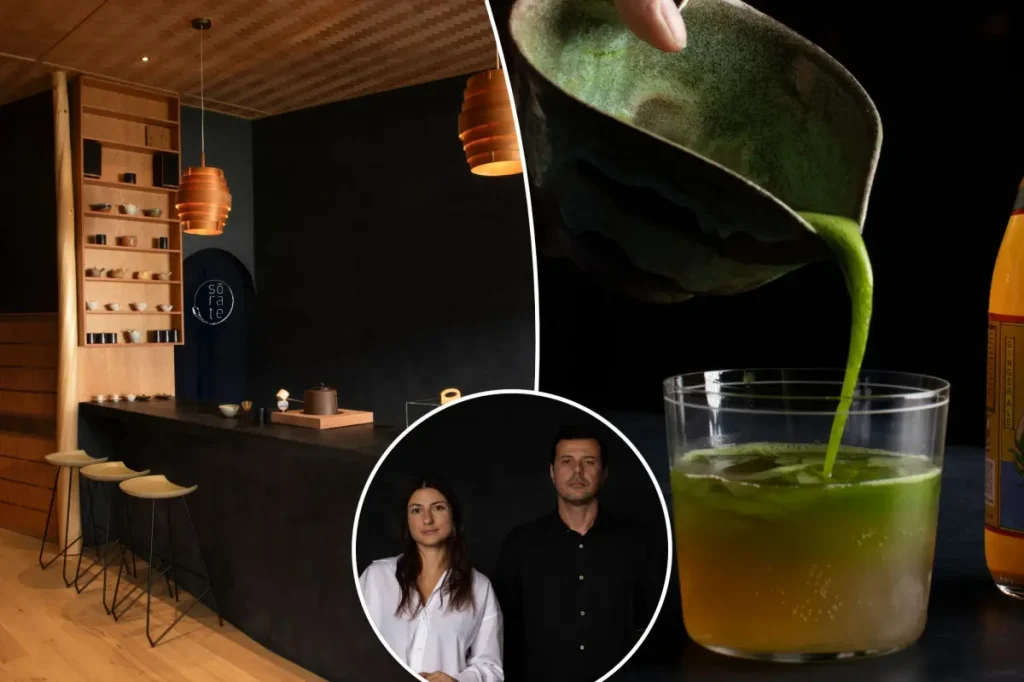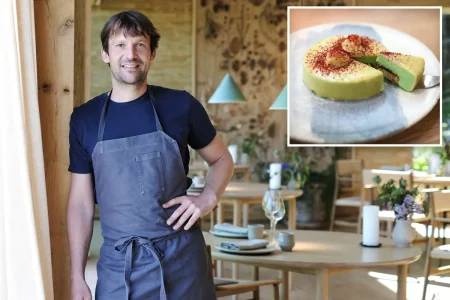Ancient Matcha Rituals Come to Manhattan: A Serene Oasis in the City That Never Sleeps
In the heart of Manhattan’s bustling Flatiron District, a new Japanese teahouse named Sōrate has opened its doors, offering New Yorkers a rare opportunity to slow down and experience the ancient art of matcha preparation. The moment you step inside, your senses are greeted by the gentle aroma of incense—the first hint that you’re leaving the city’s frenetic energy behind. Founded by Silvia Mella, who transitioned from the fast-paced world of fashion advertising to tea entrepreneurship, Sōrate aims to create a sanctuary where guests can immerse themselves in a centuries-old tradition. “Every movement and moment has a meaning,” Mella explains, encouraging visitors to “pay attention to all the details that go into preparing a single serving of matcha.” In this elegantly designed 600-square-foot space with dark walls and refined wooden elements, tea masters perform the ceremonial preparation with deliberate, mindful movements—a stark contrast to the quick-service coffee shops that populate the city.
The tea ceremony at Sōrate is a multisensory journey guided by principles deeply rooted in Japanese culture. Tea master Keiko Kitazawa, adorned in a colorful kimono, embodies these values as she prepares each serving. “The tea ceremony symbolizes harmony, respect, purity, and tranquility—in a simple bowl of tea,” she explains, referring to the four guiding principles known in Japanese as “wa,” “kei,” “sei,” and “jaku.” Guests are encouraged to listen attentively to the gentle sounds of water boiling and the bamboo whisk stirring the vibrant green powder in ceramic bowls. This meditative experience isn’t rushed—after the preparation, there’s ample time to sip, savor, and engage in conversation. The ceremony, which costs $120, transforms an ordinary beverage into an extraordinary ritual, while more accessible tastings are available for $60 in Flatiron (including snacks) or $90 with light bites at their original Soho location, which opened at 103 Sullivan Street after Mella’s online subscription service found success during 2020.
The matcha served at Sōrate represents the pinnacle of quality—ceremonial-grade powder that requires meticulous cultivation and processing. As Kitazawa explains, “High-quality matcha is hand-picked and it’s seasonal. There’s a limited time to pick the leaves and to powder the matcha. It takes one hour for just 30 grams, and each person needs two to three grams per serving.” The brilliant green tea, traditionally served without milk (though accommodations are made for those who request it), comes with wagashi—small, sweet Japanese treats made with sweet bean paste in seasonal flavors like chestnut and pumpkin, designed to counterbalance matcha’s subtle bitterness. These delicacies enhance the tasting experience, creating a harmony of flavors that complements the tea’s complex profile. Sōrate’s commitment to authenticity extends to sourcing directly from Japanese farms, where relationships between tea houses and practitioners remain central to the tradition.
The opening of Sōrate’s second location comes during challenging times for the matcha industry. This year saw a reduced harvest in Japan due to adverse weather conditions, while simultaneously facing increased global demand and a surge in tourism to Japan—all factors contributing to significant price increases for high-grade matcha. Additionally, U.S. imports from Japan now face a 15% tariff, further driving up costs. The impact is substantial: Sōrate’s house matcha that sold for $29 for 40 grams last year now commands $40, while their highest-grade offering has jumped from $62 to a striking $110. These circumstances reflect broader market trends, as Japan now exports more than half its matcha production, with retail sales growing an impressive 86% over the past three years according to research firm NIQ. The shortage has become so acute that shoppers in Japan are currently limited to purchasing just one package per person.
Despite these obstacles, Mella and her business partner Nicola Zanatta (who joined in 2023 after 15 years at Möet Hennessy) forged ahead with their expansion plans, opening the Flatiron location last month. To maintain supply, Sōrate has expanded its network of partner farms in Japan. Remarkably, Mella reports that customers have largely accepted the price increases, understanding that “this is a global issue.” This resilience speaks to a growing appreciation among New Yorkers for authentic cultural experiences and high-quality, mindfully produced goods. As Kitazawa observes, “People are so busy, but when they come to the tea ceremony, they can have their moment to relax and enjoy.” In a city defined by its relentless pace, Sōrate offers something increasingly valuable—an opportunity to pause, connect with tradition, and find tranquility in the simple act of preparing and enjoying a bowl of tea.
Meanwhile, as Sōrate cultivates moments of serenity through ancient tea traditions, another significant event approaches in Manhattan’s culinary landscape. City Harvest’s fall tasting fundraiser, “BID 2025: Fire & Ice,” will take place at The Glasshouse, bringing together over 50 of New York City’s top chefs, restaurants, and mixologists—including luminaries like Eric Ripert, Tom Colicchio, and Jean-Georges Vongerichten. The timing is critical as the city grapples with federal funding cuts for programs addressing food insecurity. As City Harvest CEO Jilly Stephens emphasizes, “There has never been a more important time for New Yorkers to come together to support our neighbors in need.” With visits to soup kitchens and food pantries at record highs and potential disruptions to SNAP benefits looming, this gathering of culinary talent serves a vital purpose beyond showcasing fine food. Last year’s event helped feed nearly 4 million New Yorkers, demonstrating how the city’s food community can unite to address urgent social needs while celebrating its rich gastronomic culture—a different but equally meaningful example of how food and drink bring people together in moments that matter.















